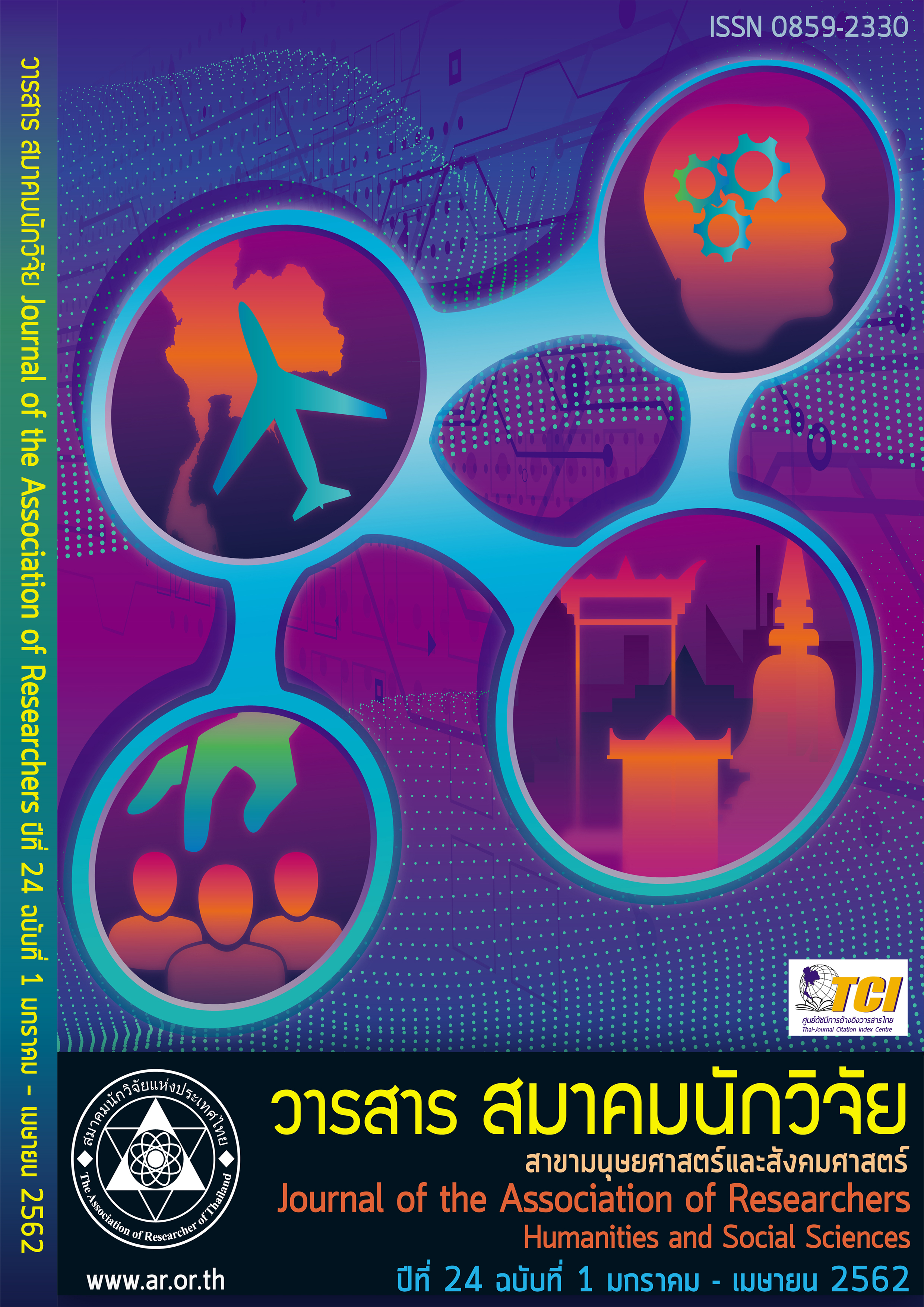The Development of Coaching and Mentoring Supervision to Enhance Learning Management in 21st Century in the Service Area of the Office of the Basic Education Commission in Chiang Mai Province
Main Article Content
Abstract
The purposes of this research were fourfold. The first is to research need analysis of the development of coaching and mentoring supervision to enhance learning management in 21st century in the Service Area of the Office of the Basic Education Commission in Chiang Mai Province. The second is to develop coaching and mentoring supervision. The third is to do experiment of supervision and the last is to assess the pattern of supervision. There are 4 steps in the process of developing supervision: study the need for preparing the supervision, develop the pattern of supervision by using coaching and mentoring supervision, demonstrate the supervision, and assess the supervision. This research was done by using coaching and mentoring supervision in 3 different schools: small, medium, and large. The Stratified Random Sampling was used to choose the target groups consisting of 30 school executives or supervisors and 30 teachers who were in supervision. The experimental instruments consisted of document analysis records, questionnaires, interviews, assessment of learning management plan, coaching and mentoring supervision records, receiving supervision records, coaching and mentoring supervision’s advising behavior checklist, assessment of supervision pattern, and focus group discussion. For qualitative data analysis, the data were analyzed and described in descriptive writing. For quantitative data analysis, the data obtained were analyzed by using percentage, mean, and standard deviation. The findings of the research “The Development of Coaching and Mentoring Supervision to Enhance Learning Management in 21st Century in the Service Area of the Office of the Basic Education Commission in Chiang Mai Province” or (PPLCA Plus) adapted from instructional system called ADDIE Model became the pattern of supervision. The pattern consists of 3 main parts: principles, key conditions, and 5 components of supervision’s pattern which are Preparing (P), Planning (P), Learning and Sharing (L), Coaching and Mentoring (C), After Action Review (A). Besides, 5 experts agreed that there are correlations between index of consistency and the supervision. Moreover, using this supervision, it was found that Plus apply the King Bhumibol’s work principles, science and philosophy in different situations. Furthermore, teachers who were in supervision can plan their learning management in 21st century in very satisfying level (83.33%) and it can be recorded after launching clearly and effectively. For coaching and mentoring supervision’s advising behavior checklist, it was in high level, the supervision can be done more than twice a month. Lastly, both supervision and teachers agree that the vital points are the cooperation of planning the goal of learning management and giving chance to teachers for having knowledge sharing.
Article Details
บทความที่ปรากฏในวารสารนี้ เป็นความรับผิดชอบของผู้เขียน ซึ่งสมาคมนักวิจัยไม่จำเป็นต้องเห็นด้วยเสมอไป การนำเสนอผลงานวิจัยและบทความในวารสารนี้ไปเผยแพร่สามารถกระทำได้ โดยระบุแหล่งอ้างอิงจาก "วารสารสมาคมนักวิจัย"
References
ดารณีย์ พยัคฆ์กุล และ วีระศักดิ์ ชมภูคำ. (2559). การพัฒนาสมรรถนะการนิเทศการศึกษาสู่ความเป็นศึกษานิเทศก์มืออาชีพ. วารสารวิชาการมหาวิทยาลัยฟาร์อีสเทอร์น. 10(4), 161-174.
ถนอมพร เลาหจรัสแสง. (2561). นวัตกรรมเทคโนโลยีสารสนเทศเพื่อการศึกษาในยคุการเรียนรู้ 4.0. เชียงใหม่: ตองสามดีไซน
ปนัดดา หมอยา และ ธรินธร นามวรรณ. (2561). การพัฒนาระบบการนิเทศแบบสอนแนะในสถานศึกษาสังกัดสำนักงาน เขตพื้นที่การศึกษามัธยมศึกษา เขต 24. วารสารบัณฑิตศึกษา มหาวิทยาลัยราชภัฏ สกลนคร. 15(69), 52-61.
วิจารณ์ พานิช. (2555). วิถีสร้างการเรียนรู้เพื่อศิษย์. (พิมพ์ครั้งที่่ 3). กรุงเทพฯ: มูลนิธิสดศรี สฤษดิ์วงศ์
วชิรา เครือคำอ้าย และ ชวลิต ขอดศิริ. (2561). “การพัฒนารูปแบบการนิเทศโดยใช้กระบวนการชี้แนะและ ระบบพี่เลี้ยง เพื่อส่งเสริมศักยภาพการจัดการเรียนรู้ในศตวรรษที่ 21 สังกัดสำนักงานคณะกรรมการการศึกษาขั้นพื้นฐาน จังหวัดเชียงใหม่. รายงานวิจัยฉบับสมบูรณ์ สำนักงานคณะกรรมการวิจัยแห่งชาติ (วช.) ร่วมกับ มหาวิทยาลัย ราชภัฏเชียงใหม่.
วชิรา เครือคำอ้าย. (2558). ตำราการนิเทศการศึกษา. เชียงใหม่: ส.การพิมพ์
วรลักษณ์ ชูกำเนิด, เอกรินทร์ สังข์ทอง และ ชวลิต เกิดทิพย์. (2557). รูปแบบชุมชนการเรียนรู้ทางวิชาชีพครู สู่การเรียน รู้ในศตวรรษที่ 21 บริบทโรงเรียนในประเทศไทย. วารสารหาดใหญ่วิชาการ. 12(2), 123-134.
สำนกับรหิารงานการมธัยมศกึษาตอนปลาย, กระทรวงศกึษาธกิาร. (2553). แนวทางการจดัการเรยีนรใู้นโรงเรยีนมาตรฐาน สากล. กรงุเทพฯ: สำนกังานคณะกรรมการการศกึษาขนั้พนื้ฐาน.
Banathy, B.H. (1968). Instructional System. Belmont, California: Fearow.
Bellanca, J., and Brandt, R. (2011). 21st Century Skills: Rethinking How Students Learn. Victoria: Hawker Brownlow Education.
Cogan, M. (1973). Clinical Supervision. Boston: Houghton Mifflin.
Dick, W., and Carey, L. (1985). The Systematic Design of Instruction. Scott: Foresman Pearson Publisher.
Gerlach, V.S., and Ely, D.P. (1980). Teaching and Media: A Systematic Approach. (2nded.) Englewood Cliffs, New Jersey: Prentice-Hall Incorporated.
Knirk, F.G., and Kent L.G. (1986). Instructional Technology: A Systematic Approach to Education. New York: Holt, Rinehart and Winston.
Knowles, M.S. (1989). The Making of an Adult Educator: An Autobiographical Journey. San Francisco: Jossey-Bass.
Merrill, M.D., Drake, L., Lacy M.J., Pratt, J., and the ID2 Research Group. (1996). Reclaiming Instructional Design. Educational Technology, 36(5), 5-7.
Mink, O.G., Owen, K.Q., and Mink, B.P. (1993). Developing High-Performance People: The Art of Coaching. Reading, Massachusetts: Addisor – Wesley.
Richey, R.C. (1986). The Theoretical and Conceptual Bases of Instructional Design. New York: Nichols.
Seels, B., and Glasgow, Z. (1990). Exercises in Instructional Technology. Columbus OH: Merrill Publishing Co.
Senge, P.M. (1990). The Fifth Discipline: The Art and Practice of the Learning Organization. Doubleday, New York: MCB UP Ltd.
Sergiovanni, T.J. (1994). Building Community in Schools. San Francisco: Jossey-Bass.
Translated Thai References
Bureau of Administration of Secondary Education. Ministry of Education. (2010). Guidelines for Learning Management in International Standard Schools. Bangkok: Office of The Basic Education Commission. (in Thai).
Chookamnerd W., Sungtong E., and Kerdtip C. A Model of a Professional Learning Community of Teachers Toward 21st Century Learning of Schools in Thailand. Hatyai Journal, 12(2), 123-134. (in Thai).
Kruekamai W. (2015). Educational Supervision. Chiang Mai: S. Printing. (in Thai).
Kruekamai W., and Kodsiri C. (2018). Full Research Reports Research Project to The Development of Coaching and Mentoring Supervision to Enhance Learning Management in 21st Century in The Service Area of The Office of The Basic Education Commission in Chiang Mai Province. National Research Council of Thailand (NRCT) with Chiang Mai Rajabhat University. (in Thai).
Laohajaratsang T. (2018). Innovative Educational Information Technology for Thailand 4.0 Era. Chiang Mai: Tong Sam Design. (in Thai).
Morya P., and Namwan T. (2018). Development of Supervision System by Coaching in School of The Secondary Educational Service Area Office 24. Sakon Nakhon Graduate Studies Journal. 15(69), 52-61. (in Thai).
Panich V. (2012). The 21st Century Skills: Learning Skills. (3rd ed.) Bangkok. Sodsri-Saritwong Foundation. (in Thai).
Payakkul D., and Chomphucome W. (2016). The Development of Educational Supervision’s Competency of Professional Supervision. FEU Academic Review. 10(4), 161-174. (in Thai).
Sungchai K. (2009). The Development of Science Teachers’ Instructional Supervision Model for Developing Academic Capabilities of Science Talented Students. Thesis, Doctor of Philosophy Program in Curriculum and Instruction, Graduate School, Silpakorn University. (in Thai).


